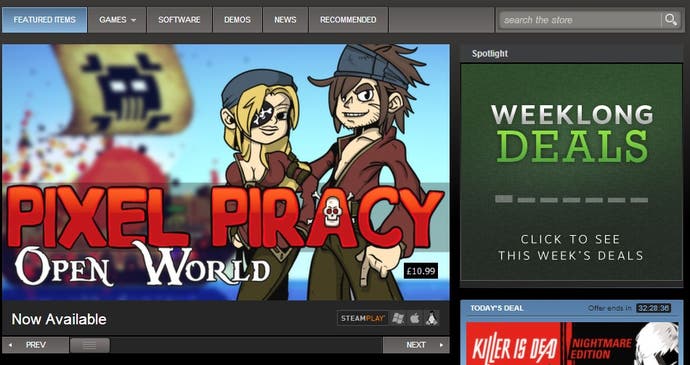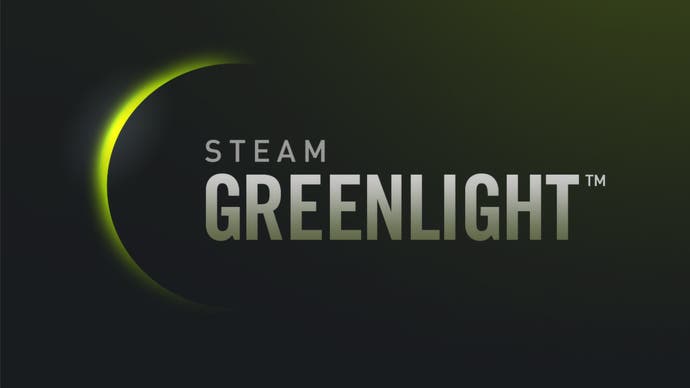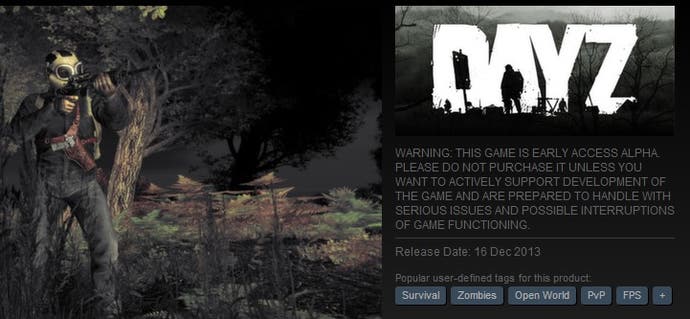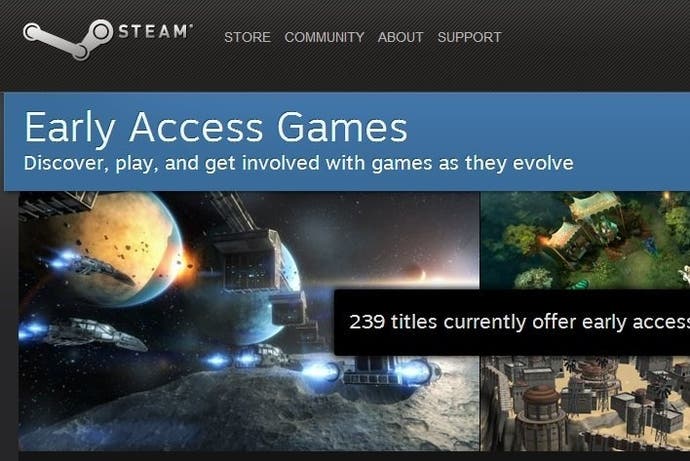Steam and Early Access: To curate or not curate?
We ask the question.
It seems counter-intuitive to say it, but Steam, the biggest and most popular digital video game shop we have, may be selling too many games - or rather, it may be selling too many of the wrong kind of games.
The Steam game catalogue bulges with over 3500 titles. And within that catalogue you find pretty much every type of game there is, from big budget shooters made by hundreds of people to experimental games made by just one person. You even find games that aren't finished yet.
So far, so good. What could possibly be the problem with a service that is as close as we've got to a video game library?
For some developers - and, to an extent publishers - the problem is one of discoverability. With so many games available, how will new games be discovered by Steam's 75 million strong audience?
Currently (that's an important word - Valve often tweaks the way Steam works), when you load up the Steam front page it presents you with an image-based carousel of "featured items". At the time of writing Divinity: Original Sin, Firefall, Dungeon Defenders Eternity, Sacred 3, Unturned, ArcheAge, Robocraft, Trails in the Sky, Counter-Strike: Global Offensive update Operation Breakout, Pixel Piracy and Dark Souls 2 DLC Crown of the Sunken King are featured items. Getting on the carousel can have a big impact on sales, developers tell us. "I get as excited being on that banner as I do funding the Kickstarters," Brian Fargo, boss of Wasteland 2 developer inXile, tells me. "When you're on that banner it's a big deal."

There are a number of other sections below "featured items", including "recently updated", but the one we're interested in is the one the Steam front page defaults to: the "top sellers" list - a chart of the best-selling games on Steam at any given time.
If a new games comes out and you know you want it (perhaps you read a review on Eurogamer, because you're good like that), you'll seek that game out. You'll search for it in the Steam search box if it isn't displayed prominently on the Steam home page. But a lot of people don't do that. A lot of people browse the Steam store looking for something to play, and they see what's hot in the carousel, what's on the top sellers list, or spot a crazy bargain, and go from there.
But what if your new game isn't a "featured item", or doesn't show up in the "top sellers" list, or isn't on sale? Then there's a good chance it won't be displayed on the front page of Steam.
"This is something everyone has been talking about a lot," Dean Hall, the brains behind zombie massively multiplayer survival game DayZ - one of the biggest and most enduring hits on Steam - says. "This is probably over the last few months the most talked about conversation I've had with developers.
"I'm a big consumer on Steam. I use it for all my games. I'm a PC gamer. So, I do find it frustrating because I'm super lazy and I miss stuff. I missed Maia because it came out right when we were releasing DayZ. I only picked it up when I went to Rezzed.
"So it can be very hard for me to discover games. I rely a lot on people on my Steam friends list telling me you totally need to play this game or that game. So I think discoverability is an issue."
If discoverability is an issue now, it wasn't a few years ago, when Steam worked in a very different way. It was curated, to a large degree, by Valve itself, ensuring a degree of quality control. The front page defaulted to new releases, so if you launched a game on there you would be guaranteed at least some time on the front page. Usually you'd get a few days, because the number of games that launched on Steam was smaller than it is today.
In 2012 Valve introduced Steam Greenlight, its idea for dealing with the growing number of developers who wanted to sell their games on Steam. It was designed to take the load off, essentially, handing over some of the curation work to its community. In Valve's own words: "Over the many years that Steam has been selling games, the release rate of games on Steam has continued to grow significantly. During that time, there's always been a reliance on a group of people to make tough choices on which games to release on Steam. While that group has attempted to pick the games they felt the community would most want to see on Steam, we knew there had to be a better way." Developers had to convince people to cast their vote: would you buy this game? Yes? Then vote for it on Steam Greenlight. If a game got enough votes, Valve would get round to greenlighting it for release. Job done.

The launch of Greenlight was the moment Valve unlocked the door to Steam, and every day since then that door has opened a little bit wider, lowering the barrier to publishing and triggered what some have called a flood of games to come crashing down onto the platform's virtual plain. In May a report by industry website Gamasutra revealed more games had released on Steam in the first 20 weeks of 2014 than during the whole of 2013. Every day around a handful of games come out. On 25th June 75 games were greenlit for release. On 11th July 75 games got the thumbs up. On 1st August another 50 titles were approved. In total 1105 games have been greenlit for release. 391 have actually been released.
"Valve has said they don't want to be the curators any more," Hall continues. "That's pretty good of them to say that, but they can only win, really, because they're a hit driven business. Steam makes its money from hit games. They want to open the floodgates because they want the next DayZ or the next Minecraft or whatever to release on Steam.
"From a selfish standpoint it's better for me if there's not many developers on Steam because then if my game releases on Steam it's going to get a lot of exposure and a lot of people buying it. But that's why there's a whole bunch of developers always saying, 'I really want to get my game on Steam,' because in those days you were reasonably guaranteed to do a lot of sales.
"Unfortunately, beware what you wish for."
You would probably expect developers to share this view, because at the end of the day they're most interested in selling their own games. But now there's a real sense that gamers are getting sick of the flood of titles washing over Steam, too, but for a different reason.
This different reason has to do with Early Access, which has raised more than a few eyebrows as Steam's gates have opened this year.
The Early Access program, designed to let developers sell unfinished games with a view to improving them over time based on player feedback, opened in March 2013 and since then 239 games have launched under its banner. And since then there have been a number of high-profile cases in which players have complained about the poor quality or lack of updates of Early Access games. In some cases Valve has stepped in. In May Valve hauled Early Access first-person sci-fi post-apocalyptic open-world game Earth: Year 2066 from Steam and offered refunds to disgruntled customers after the game had been labelled "broken" and unfit for sale. The developer, Killing Day Studios, had also been accused of misleading customers with inaccurate claims on the game's Steam product page.
In June Valve eventually responded to this groundswell of concern by issuing a warning about Early Access, saying developers may never finish their games. In an update on the Early Access FAQ, Valve asked the question, "When will these games release?", and answered by saying players should be aware that some developers will be unable to finish their game - for whatever reason. So, only buy an Early Access game if you're excited about playing it in its current state, Valve warned.
The discoverability debate is really about curation. There's a feeling that Valve should do more to impose a quality control for Steam, protecting gamers from potential scams and developers - those who use Early Access the right way, anyway - from being tarnished by association.
"To curate or not curate? That is the question," Wasteland 2 chief Brian Fargo says. A complete lack of curation reflects the "dark side" answer.
"I personally prefer a little curation, even if the bar is a little bit higher to get onto. I think that's okay, because the ones that couldn't make that bar, they're not going to sell anyway. It cleans it up a bit for the people who are hitting this minimum that should be there. It doesn't have to be draconian."
But not all developers agree with Fargo's view. Some believe that, philosophically, no-one has the right to stop someone from selling a game on Steam. They call for an open, democratic system where everyone has a shot at the big time. Then, the theory goes, if the game is great, it'll sell. If it's rubbish, it won't. The community will determine its fate, casting judgement with all the virtual weight our imaginary and metaphorical internet hammer can muster.
One of these developers is Andy Hodgetts, co-creator of zombie MMO Project Zomboid. Project Zomboid was one of the first games to appear on the Steam Greenlight program, and it's currently an Early Access title itself. Hodgetts wonders if Valve - or anyone else for that matter - has the right to decide what makes for a "good game" and whether it should be released.
"To say these games don't meet my standards, therefore they should not be allowed on Steam, it's like, well what right do you have to say that?" he says. "Screw you. If they make a game and want to get the game on Steam, let them knock themselves out. If I was a 15-year-old kid now and I was able to make a game that could actually go onto Steam I would be overjoyed. When I was that age the only way to get a game into someone else's hands was to sign a publisher. You could give a cassette to your mate but you couldn't get it into the shops. It just seemed like an impossible dream.
"But now you've got kids who are maybe aspiring video game makers, and yeah, their first couple of games might be absolutely terrible, but who's to say they shouldn't have the opportunity to get them in front of people? Why not? Who cares? If they're terrible, nothing will happen. They won't sell. They'll just disappear. And if they're good they'll sell. And if they're good, then who cares? It's good for everybody.
"I find it a bit self-interested to say, I've decided what I consider to be the minimum acceptable bar for Steam. It's really got nothing to do with me. It's not my choice."
"What's the alternative?" Hodgetts continues. "We just close down the hatches and say, no, we must keep this thing precious to ourselves? It's ridiculous. I find these opinions either to be hypocritical or to be insular and selfish and egotistical. It's like saying, oh, if that game was made in Game Maker it doesn't count. Real games are written in C++. So what that it's made in Game Maker? Or Adventure Game Studio? Or RPG Maker? Is the game any good? Surely that's the only benchmark worth testing against. It doesn't make a difference what it was made in. It doesn't make a difference who made it."
That would be fine, of course, if all Early Access titles played nice, whatever their quality. But some developers aren't pulling their weight. We've seen cases where developers haven't updated or improved an Early Access game often enough, or at all, which leads some to wonder whether they've taken the money made by sales of the game and done a runner. And we've seen game product descriptions that fail to match up with the games they're describing. We hear the word "scam" and the phrase "false advertising" associated with video games more often than ever before, it seems.
This is a genuine area of concern, Hodgetts says: "That does sadden me quite a lot. I think Valve has done the right thing in that FAQ. They need to protect the consumers primarily, not the developers. They probably could have gone further than that."
Simon Roth, creator of sci-fi god game Maia, is also worried. "People are becoming slightly more suspicious of Early Access," he says.
"I had the opposite of this problem. I had someone complain because I updated the game too much. I was using up his bandwidth, apparently. I didn't understand that one at all."
"It annoys me when I see other devs not really embracing this, because they've been given the tools, and Valve's tools in that regard are really great. There are so many pitfalls. Things like making yourself too open, or not open enough. There's a balance that's hard to strike. A lot of people are still finding their feet in that regard. I've seen developers really put their foot in their mouth when it comes to it. But in the last four months it's calmed down. A lot of people have got into the flow of things.
"It can be difficult because you have a completely new audience constantly, which is fantastic for testing the game because fresh eyes every day, but at the same time fresh eyes might send you 10 emails, which can completely overload some people.
"Considering my mailbox, I think a lot of devs have been really good. A lot of the early UK Kickstarters have been good because we know you can't just go silent for a month. Otherwise people will start getting antsy. Maybe some devs might fall by the wayside, but I don't think there's been any catastrophic failure yet. There might one day be one.
"Most of the Early Access games, even the ones with the most terrible communication, have been better than EA in communicating with Battlefield 4. These things are not as bad as they appear. Waiting ages for a patch that breaks things more - more people will get it soon and get into the swing of things."
Swen Vincke, boss of Divinity: Original Sin developer Larian, has accepted Early Access will get abused. But he is determined to see the positives in the system.
"We've gone through the Early Access process and it was honestly the best round of QA we've ever had in our lives. It made a better game, and our players are happy because they got the game they wanted.
"You have that in any industry. Look at how badly free-to-play has been abused.
"Any good thing will always have bad things associated with it. I believe Early Access is a blessing for developers. What is the biggest reason why a publisher gets its greedy hands on a game? Because the financing of the developer is insufficient. An entire business has been built around it and it has led to the destruction of plenty of innovation, or at least the slowdown of plenty of innovation.
"Only since developers can make the link to their customers have you seen an incredible explosion of new types of games, pretty much like we had back in the days of the Amiga and Commodore 64. So I'm very happy that happened."
At the beginning of this investigation we wondered whether discoverability was ruining Steam. Now we're nearing its end, it seems Early Access is the cause of most concern. We've heard talk that Valve will ditch Greenlight and make Steam an open platform for developers and publishers, and some are worried this will fuel a "race to the bottom" as Steam turns into an "App Store for PC games". But most reckon Valve won't let Steam get that bad. In truth it's Early Access that's causing a rift between developers and gamers, because those who abuse the system could be spoiling the party for everyone.
So what's to be done? Hodgetts has a cool idea. He suggests Early Access games have a colour-coded indicator. Red would mean the developer has only just started work on the game, and green means it's nearly at beta. Between the colours is a line, with a pointer indicating where the game is along its development path.
You could even take the progress bar out of the hands of the developers and put it in the hands of the gamers, Hodgetts suggests. Each customer could click on the bar, indicating where they thing the game is in development. Steam could work its magic and almost crowdsource the result everyone sees.
"You need to know as a consumer," Hodgetts says.
"So, if you're going to open up very often very early builds then Steam have a right to put safeguards in place there, even if that's to the cost of the developer. And the developers have an obligation to make things as clear and as transparent as possible. DayZ for example, there's a very nice explanation of what the state of the game is. It's very self critical. That's what people need to do, to make it abundantly clear."

There have been calls from some quarters for Valve to scrap the Early Access system and think again about how to sell unfinished games. But Simon Roth believes Early Access isn't going anywhere. That's because younger gamers expect games to be released before they're finished. That's just the way it is now.
"It represents a shift in how games are played," he says. "Kids nowadays, they don't care about an alpha. They don't need to be explained what an alpha game is, and that it's still in-development stuff. When we showed Maia at EGX Rezzed, every time a kid sat down we had to explain it was an alpha game. But they just turned around and said, 'oh yeah, I know,' and just waved us away. It was like, okay. We showed it at Minecon with a whole bunch of other alpha games, because Notch was very kind to invite us. The kids don't just play alpha games, they expect alpha games. If your game isn't in alpha, they suspect there's something suspicious about your game. Why are you not letting people play it yet?"
There are rumours swirling around about how Valve intends to hand over curation of Steam to the gamers themselves. The idea is we'd each have our own, personal and customised store front. And you could, in effect, follow a friend's store front, which would then influence what you see when you load up Steam. This is what Dean Hall, Brian Fargo and others believe may happen.
The natural progression of this system is that the most popular store fronts would belong to the most popular gaming celebrities, perhaps mega YouTubers. How many millions will follow a Dota 2 broadcaster's Steam store front, and thus default to that? Or how many will follow PewDiePie's? And where would that leave discoverability?
As Steam grows ever more popular and its game catalogue swells, the old systems upon which it was built creak, twist and contort. Perhaps Valve will completely redesign the client, offering a refresh better suited to the needs of today's gamers, who are hungry for deals, desperate to play games before they're finished and keen to know the recommendations of their friends and gaming heroes.
As with most things relating to Valve, Steam is impossible to predict. But one thing is clear: the customer is the centre of Steam's universe - for better and for worse.
"It's going to get more consumer friendly and harder for developers individually," Hodgetts says. "But we would have to be rather selfish to say that wouldn't be a good thing, because we're gamers too."




